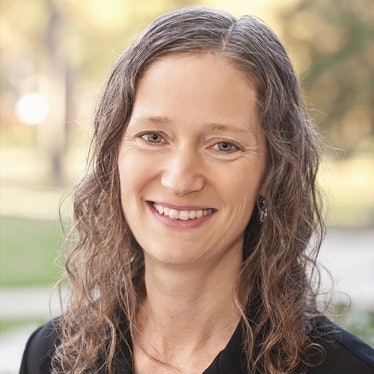Less than a month after the start of the academic year, the Texas state legislature passed SB-8, a ban on abortion past six weeks, before many women even know they are pregnant. Joanna Grossman, professor of women and the law at Southern Methodist University’s Dedman School of Law in Dallas, Texas, noticed the climate among students shift in her reproductive rights course.
“I have a room full of students who are interested in these issues anyways. In that context, I’m seeing a lot of fear and confusion about what the future holds for them,” said Grossman. “I think the students want reassurance that this isn’t really happening or that it really doesn’t mean what they think it means. And obviously, I can’t really provide them that reassurance.”
With the U.S. Supreme Court poised to potentially overturn Roe v. Wade, the right of women to end pregnancies has gripped the national conversation—and higher education.
SB-8 effectively allows any person to sue someone else for providing an abortion or helping to do so in the state (with “help” vaguely defined, legal experts point out). This summer before the bill passed, some conservative legislators in Texas were already turning their attention to the role of college campuses, calling to defund public universities that offer abortions to students.
“College campuses have always been at the epicenter of some form of reproductive rights organizing,” said Mary Ziegler, professor of law at Florida State University. She studies the legal history of abortion in the U.S. “That also goes for anti-abortion student groups working with the GOP. So, in both cases, younger people have helped set the terms of the debate. That makes sense because they are the people most likely to be affected. Because they are of reproductive age—and will be for a long time.” 
The Guttmacher Institute, a nonprofit research organization centered on reproductive justice, found that nearly 40% of people who seek an abortion say they do so at least partially because having a child could derail their education. In 2014, according to Guttmacher, women aged 20-24 made up the largest proportion of people in the U.S. who had abortions. According to the National Center for Education Statistics, an undergraduate student is on average under the age of 25.
“There’s never enough attention paid to how reproduction affects education, and that extends to a lot of issues,” said Grossman. “Like the lack of contraceptive access for many students or the lack of bodily autonomy to not be sexually assaulted. On top of that is the significant impact of abortion rights, which shape the course of students’ lives. We already know that many students will drop out of school due to an unwanted pregnancy.”
Grossman referred as well to a recent amicus brief filed to the U.S. Supreme Court by female athletes, including those at colleges and universities, on the importance of reproductive freedom to their college sports careers. The brief was in response to SB-8.
That relationship between barriers to getting an abortion and to getting a degree pushed student organizers in California’s public university system in 2019 to take action.
Phili Villalobos, now a 22-year-old undergraduate at the University of California Santa Barbara (UCSB) worked to pass SB-24, a bill that mandates public college campuses in California provide medication abortion to students at university health centers.
“Logistically, it’s really difficult for a lot of students to get off campus to go to an abortion clinic in time,” said Villalobos, who is also a California Field Organizer with United for Reproductive & Gender Equity (URGE), a national youth-led reproductive rights and justice nonprofit organization that advocated for SB-24.
The nearest abortion clinic to UCB is more than seven miles away, said Villalobos. But there is a crisis pregnancy center, also known as a fake abortion clinic, closer to campus. Antiabortion groups tend to run these centers, which look like abortion clinics but do not provide abortions and often counsel patients not to end a pregnancy. So, Villalobos added, some students may get confused and end up at a so-called fake clinic without getting the healthcare they seek.
“Many students don’t have transportation to get to the clinic while managing a full course load as well as a job,” she said. “So, students are put in these situations with a lot to navigate to get abortion care. Having the abortion pills on campus at your health centers just makes sense and makes students’ lives much safer in their community.”  Dr. Carrie Baker, professor women and gender studies at Smith College
Dr. Carrie Baker, professor women and gender studies at Smith College
A similar bill as SB-24 has been introduced in Massachusetts, but it has not yet passed. Dr. Carrie Baker, a professor of the study of women and gender at Smith College, has started to conduct research related to the bill on such issues as how far abortion clinics are from the state’s public campuses.
“We’re framing the bill as an educational equity issue, especially for low-income students and students of color, who need access to equal healthcare without burdening their ability to do what they need to do as students,” said Baker, referring to research showing that many women who seek abortions in the U.S. are low-income people of color.
Yet experts like Grossman have noticed that college administrators have been hesitant to take a public stand on students’ reproductive rights.
“If you think about the way lots of universities felt motivated to respond to Black Lives Matter because their students demanded they take a position, this is the kind of issue where you could imagine a groundswell like that,” said Grossman. “But I haven’t seen it yet. I expect that female students want their universities to take a stand in favor of protecting their human rights.”
Baker similarly said that if more than half of the student population in higher education identifies as women, then more institutions should pay attention to abortion access. Women in the 2020-21 academic year made up a record 59.5% of college students, according to the National Student Clearinghouse’s enrollment data
“Why aren’t more colleges making statements on what’s happening? I’ll tell you why. It’s because it’s the A-word,” said Baker. “It’s controversial. Unlike racial justice, it’s seen as a private issue, a medical issue. People don’t see it as a social justice issue in the same way.”
Grossman agrees with what some scholars call abortion exceptionalism.
“There’s this idea that no normal rules apply. If it’s abortion, it’s just its own thing,” said Grossman. “But abortion is integrally related to women’s human rights. I wish the world saw it that way. Instead, you just say the word ‘abortion,’ and university administrators shrink away.”
Baker also noted that because abortion is often stigmatized, it can be silenced and harder for college administrators to know about the need for abortion care on campuses.
Back in Texas, reports have already shown a so-called brain drain in light of SB-8 as employees and businesses look to leave the state. Grossman said she would not be surprised to also see some sort of decline in students coming to Texas to get their college degrees.
“That’s a very likely effect here: on matriculation, on recruiting, and on business in general. The Texas GOP has decided they don’t care,” said Grossman. “A lot of states are hostile to abortion rights, but this is the only state with a ban that has been able to take effect. Texas has become ground zero for this battle.”
She pointed out that soon more states may look like Texas if legislatures follow their playbook. Some republican legislators in Florida, for instance, have said they want to introduce a bill like SB-8.
“But right now, it’s Texas and everybody else,” said Grossman. “Abortion rights are generally very popular in the country. This ban is not. So, will people vote with their feet?”
Rebecca Kelliher can be reached at [email protected]



















